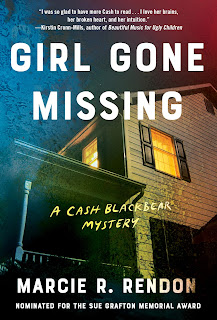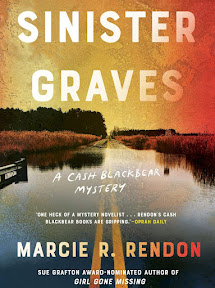I saw Marcie R. Rendon’s Murder on the Red River on the New Books shelves at my lovely local library (written in 2017, republished in 2022), and picked it up and wolfed it down. I whizzed through the series via Libby, continuing with Girl Gone Missing and Sinister Graves.
Despite Cash’s trauma, she is capable of empathy and more. She tries to save some orphaned kids from getting split up into the foster system; when she starts going to college in the second book, she starts making friends, or at least acquaintances, and leads some strangers out of serious trouble.
She’s sensitive, although she mostly hides it, acting out on occasion, and intelligent, although this too gets her into trouble. She also has dreams, visions, and occasional out-of-body experiences, which are not always as effective at warning her as she would prefer. It could be argued that she may not have mystical powers and is just putting facts together subconsciously, but at least while reading, I prefer to take her word for it.
By the end of the third book, she has cut down on her drinking, moved through a couple of empty relationships and found someone who seems to truly understand and appreciate her for what she is instead of just using her. She has made some other life changes that seem very positive, although I won’t give any more spoilers than I already have. If these three books are all we get of Cash Blackbear’s story, I’m satisfied with her arc.
Besides Cash’s story, a major throughline of Rendon’s books is the mistreatment of Native Americans, particularly children. Individual crimes against individual Native Americans are easily swept away and unnoticed. Broken foster-care systems in the Midwest are depicted as a pipeline for forced agricultural labor, and abuse is routine.
In foster homes, there were days and nights that were hell on earth–times she would fall asleep hoping to not wake up, or almost convincing herself life was a dream and dreamtime was the real time. Her one respite during all those years was compulsory education. That was a rule even the foster families didn’t dare break. – Sinister GravesOf course, compulsory education has itself been used as a systematic tool of oppression and erasure of Native American culture. Between 1819 and 1969, more than 500 indigenous boarding schools were operated in the U.S., many with explicit goals of assimilating children into majority-white society, by taking children from their parents, renaming them, forbidding them from speaking any language but English, and disallowing their local hairstyles and clothing; moreover, many of these schools were also associated with churches and missionary societies and exerted considerable pressure for Christian religious observances.
A 2022 U.S. Interior Department investigation “found that 19 boarding schools accounted for the deaths of more than 500 American Indian, Alaska Native, and Native Hawaiian children but the number of recorded deaths is expected to increase.”
The Author’s Note at the end of Sinister Graves says it was written before 215 children’s bodies were found in unmarked graves at the Catholic-run Kamloops Boarding School grounds in Canada. Thousands more died while attending Indian residential schools in Canada, according to the Truth and Reconciliation Commission of Canada.
Coincidentally, around the time I was finishing Sinister Graves a few weeks ago, news broke on multiple outlets about Tibetan boarding schools that appear to be enforcing assimilation into Chinese culture. According to the Associated Press, “China has shuttered village schools across Tibet and replaced them with centralized boarding schools over the last dozen years.”
About a million Tibetan children, which is most of the school-aged population, including preschoolers as young as 4 years old, are estimated to be studying at these schools. Chinese authorities claim that’s voluntary, but with former local schools closed and penalties for non-attendance, it’s not much of a choice.
I doubt that international calls to disband these boarding schools will have any effect on Chinese policy, any more than protests have had against their Uighur re-education camps. It took the U.S. and Canada well over 100 years to realize how wrong they were to attempt forced assimilation of indigenous populations into the dominant cultures, and unfortunately, many people still believe in this policy, or at least see little harm in it (e.g., efforts to overturn the Indian Child Welfare Act).
Books like Rendon’s help bring the impact of this horrible policy into emotional reality for readers. Moreover, this series is interesting and occasionally very exciting. Sometimes the villains are a little predictable, and I’m not so sure that things would always turn out as well for Cash as they do, but she earns it. On the whole, I’m cheering for Cash, and I recommend these books.



love the international look at the world thank you mrr
ReplyDelete